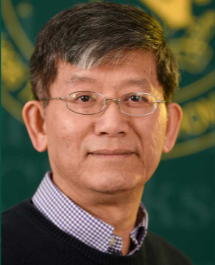 Ming-Cheng Cheng
Ming-Cheng Cheng
Learn to Achieve Fast and Accurate Thermal Simulations of Multicore Microprocessors Guided by Physical Principles with Application to Thermal-aware SchedulingProfessor of Electrical Engineering Department of Electrical & Computer Engineering Clarkson University, Potsdam, NY, USA
CISTER, Porto, Portugal
ABSTRACT:
Several data-driven learning simulation methodologies revised from proper orthogonal decomposition (POD) and Galerkin projection will be presented for dynamic thermal simulations of multicore CPUs/GPUs. The POD-Galerkin learning approaches rigorously incorporate physical principles of heat transfer to achieve high accuracy and efficiency with a remarkable learning ability for situations outside the training bounds. The major drawback of POD-Galerkin is the enormous computational effort needed to collect a massive amount of training data for large-scale microprocessors with many heat sources (such as many-core GPUs). In this case, the data required in training to account for all combinations of dynamic variations of heat sources becomes prohibited. To overcome this issue, several revised POD-Galerkin approaches have been investigated to examine the training effectiveness while maintaining high simulation accuracy and efficiency. One of the approaches has been demonstrated in thermal simulation of NVIDIA Tesla Volta™ GV100, a GPU with more than 13,000 cores. To predict the maximum temperature in the entire GPU at each time step, the approach offers a computing speed near 1.1 million times faster than the FEM with a maximum error near 1.2oC. Implementation of POD-Galerkin in thermal-aware scheduling of a CPU will be presented and their future applications for thermal-aware scheduling are discussed.
BIO:
Ming-Cheng Cheng received the B.S. degree in Electrophysics from National Chiao-Tung University, Taiwan, and the Ph.D. degree in Electrical Engineering from Polytechnic University, Brooklyn, NY, USA. He is currently a professor in Electrical and Computer Engineering at Clarkson University, Potsdam, NY. His research has covered a wide range of areas including electron transport modeling of solid-state devices, spin-polarized electron transport, electro-thermal simulations of semiconductor devices and integrated circuits, electromagnetic simulation for core losses in magnetic materials, etc. Recently, he has devoted his effort to developing effective physics simulation methods based on physics-informed data-driven learning algorithms for different research areas, including dynamic thermal analysis of ICs, CPUs/GPUs, thermal-aware task scheduling in multi-core microprocessors, simulations of quantum eigenvalue problems for nanostructures and materials, DFT simulations, electromagnetic/photonic simulations, etc.
Event photos can be found HERE.








